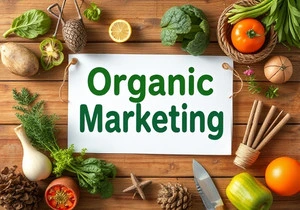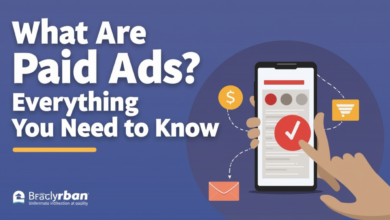Organic Marketing

Introduction
Have you ever felt frustrated by the relentless pursuit of paid advertising, only to see temporary results and mounting costs? In a digital landscape dominated by ads, organic marketing presents a refreshing, sustainable alternative. Unlike paid strategies that often fade when budgets run dry, organic marketing creates lasting connections with your audience. It’s about reaching people through authentic, meaningful engagement rather than competing for their attention with dollars.
Imagine creating content that resonates so deeply with your audience that they naturally want to engage, share, and follow along. That’s the power of organic marketing. In this guide, you’ll discover the strategies, channels, and practices that make organic marketing an invaluable part of any digital marketing plan. We’ll cover everything from understanding what organic marketing is to developing a plan that will help your brand grow and thrive—without paying for every click or impression.
Table of Contents
What is Organic Marketing?
Organic marketing refers to strategies that naturally attract and engage audiences without relying on paid advertising. It focuses on delivering genuine value and building trust with your audience over time. This approach contrasts with paid marketing, which involves spending on ads to achieve immediate but often short-lived results.
Difference Between Organic and Paid Marketing
Understanding the difference between organic and paid marketing can help you make more strategic decisions for your brand:
- Organic Marketing: Relies on methods like SEO, social media content, and email newsletters to connect with audiences naturally. It builds a community over time and provides long-lasting value.
- Paid Marketing: Involves ads that drive quick traffic and results, but can be costly and unsustainable without a continuous budget.
While both types have their place, many brands are turning to organic marketing for its authenticity and sustainable benefits. Paid ads can be helpful for short-term campaigns, but organic strategies provide a foundation for long-term growth.
Key Benefits of Organic Marketing
Cost-Effectiveness
Organic marketing can be highly cost-effective because it relies on content quality and audience engagement rather than ad spend. It requires an investment in time, creativity, and strategic planning, but it eliminates the need for a large advertising budget.
Building Brand Loyalty
Organic marketing fosters a deeper connection with your audience, leading to greater brand loyalty. When you engage genuinely and provide value, customers are more likely to trust you, recommend your brand, and become repeat customers.
Improved Search Engine Rankings
SEO is a central component of organic marketing, and as you create valuable, optimized content, your search engine rankings improve. Higher rankings mean more visibility and traffic, all without paying for ads.
Long-Lasting Results
Unlike paid ads that end as soon as the budget runs out, organic marketing efforts compound over time. Quality content, strong SEO, and active social media engagement build a foundation that continues to drive traffic and engagement long after the initial work is done.
Organic Marketing Channels and Strategies
Social Media Marketing
Social media platforms like Instagram, Facebook, and LinkedIn are perfect for organic engagement. Here are some effective social media strategies:
- Create engaging posts: Use visuals, questions, and polls to start conversations with your followers.
- Share user-generated content: Encourage customers to share their experiences with your brand, and repost this content to build community.
- Foster a sense of community: Go beyond broadcasting—engage with comments, follow relevant accounts, and participate in trending conversations.
Content Marketing
Content marketing focuses on creating valuable resources like blogs, videos, infographics, and guides to attract and educate your audience. This is a powerful organic strategy because:
- Content answers audience questions: Well-researched content can address common questions and problems, making your brand a trusted resource.
- SEO benefits: Optimized content improves your search ranking, driving more organic traffic to your site.
Email Marketing
Email marketing remains one of the most effective ways to build relationships with your audience. With organic email campaigns, you’re not trying to sell immediately but instead focusing on nurturing trust over time.
- Personalized content: Segment your email list and send personalized content based on subscriber interests and behaviors.
- Value-driven communication: Provide exclusive tips, insights, or early access to new products rather than just promotional content.
SEO (Search Engine Optimization)
SEO is the backbone of organic visibility. By optimizing your content for search engines, you make it easier for potential customers to find you when they search for relevant topics.
- Keyword research: Find relevant keywords that align with your audience’s search intent.
- On-page optimization: Use keywords naturally in your titles, headings, and throughout your content.
- Quality backlinks: Earn links from other reputable sites to build authority and trust with search engines.
Developing an Effective Organic Marketing Plan
Setting Clear Goals and Objectives
Start with specific, measurable goals for your organic marketing strategy. Focus on long-term objectives like brand awareness, engagement, and customer retention rather than quick wins.
Identifying Your Target Audience
Understanding your target audience is critical for organic marketing. Conduct market research to learn more about their needs, preferences, and pain points so you can create content that resonates.
Creating a Content Calendar
Consistency is key to effective organic marketing. Use a content calendar to plan and organize your posts across different channels.
Measuring Success with Key Metrics
Tracking your progress helps you adjust and optimize your efforts. Here are some common metrics for organic marketing goals:
| Goal | Key Metric | Example |
|---|---|---|
| Brand Awareness | Organic traffic growth | Track through Google Analytics |
| Engagement | Social media interactions | Likes, shares, comments |
| Conversions | Email click-through rate | CTR, open rates |
Best Practices for Successful Organic Marketing
Focus on High-Quality Content
High-quality content is the foundation of organic marketing. Prioritize authenticity, relevance, and consistency to create content that your audience genuinely values.
Engage with Your Audience
Engagement builds relationships and trust. Respond to comments, ask questions, and encourage conversations on your social media channels to keep your audience involved.
Use Keywords Naturally
For SEO to be effective, keywords need to fit naturally within your content. Keyword stuffing can harm readability and affect your SEO performance, so integrate them in a way that feels organic.
Collaborate with Influencers and Partners
Partnering with relevant influencers or industry partners can extend your reach and help you connect with a broader audience. Look for individuals or brands that share your values and complement your offerings.
Adapt and Evolve
The digital landscape is always changing, so be prepared to adjust your organic marketing strategy. Regularly analyze your results, stay updated on industry trends, and adapt your tactics as needed.
Conclusion
Organic marketing is more than just a cost-saving strategy—it’s a way to build meaningful, lasting connections with your audience. By focusing on quality content, authentic engagement, and effective SEO, you can achieve sustainable growth that extends beyond the reach of paid ads. Embrace organic marketing as a core part of your strategy, and you’ll find it not only elevates your brand but also builds a community that believes in your vision.
Are you ready to take your marketing strategy to the next level? Start implementing these organic marketing tactics today and experience the difference of sustainable, authentic growth.
FAQ Section
What is organic marketing?
Organic marketing is a strategy focused on engaging audiences through unpaid methods like content creation, social media, email marketing, and SEO, rather than relying on paid ads.
What are the benefits of organic marketing?
Organic marketing builds brand loyalty, improves search engine rankings, and provides long-lasting results without a heavy reliance on ad spend.
What are the key channels for organic marketing?
The main channels for organic marketing include social media, content marketing, email marketing, and SEO.



